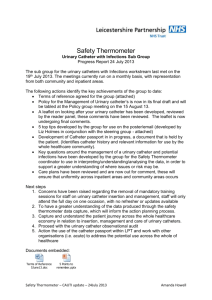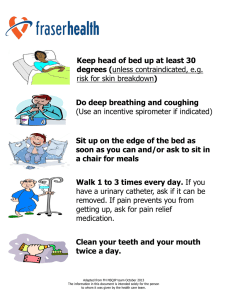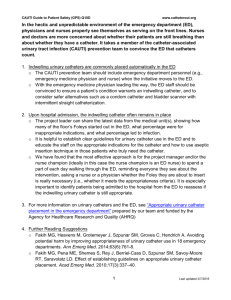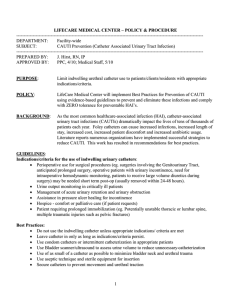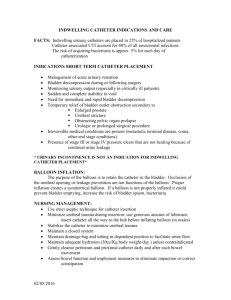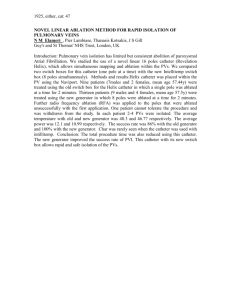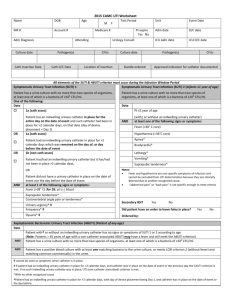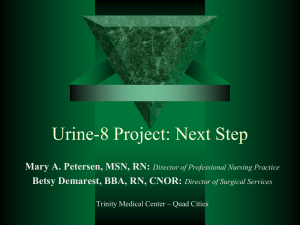Role description of lay panel member RPW (2)
advertisement
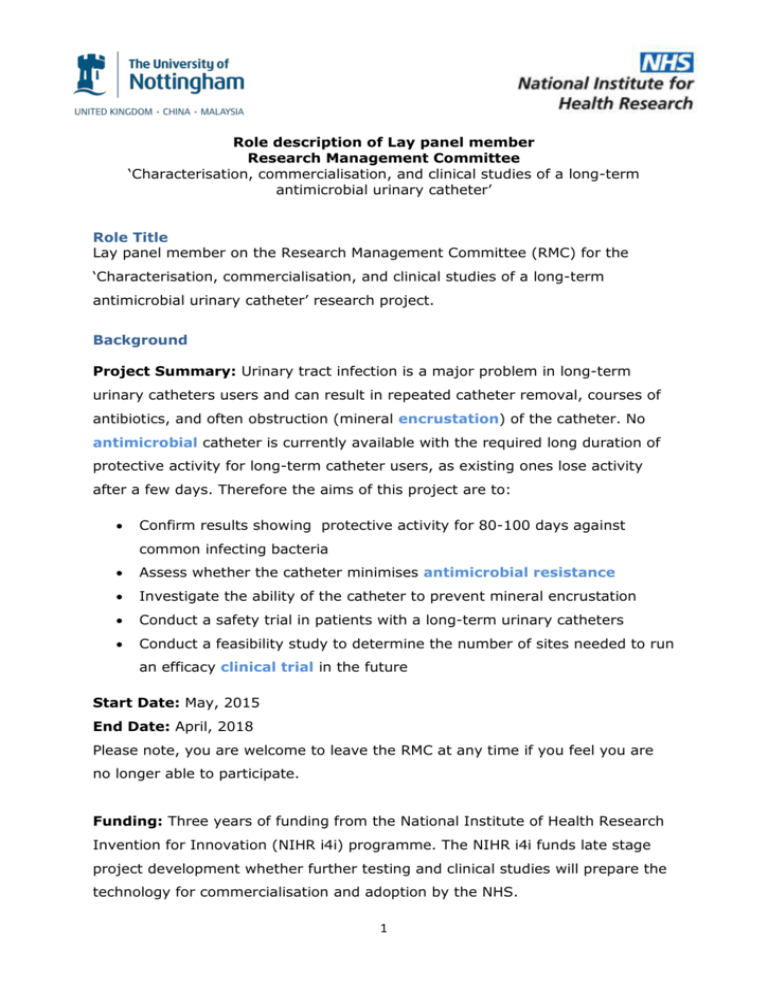
Role Description for Lay panel member Role description of Lay panel member Research Management Committee ‘Characterisation, commercialisation, and clinical studies of a long-term antimicrobial urinary catheter’ Role Title Lay panel member on the Research Management Committee (RMC) for the ‘Characterisation, commercialisation, and clinical studies of a long-term antimicrobial urinary catheter’ research project. Background Project Summary: Urinary tract infection is a major problem in long-term urinary catheters users and can result in repeated catheter removal, courses of antibiotics, and often obstruction (mineral encrustation) of the catheter. No antimicrobial catheter is currently available with the required long duration of protective activity for long-term catheter users, as existing ones lose activity after a few days. Therefore the aims of this project are to: Confirm results showing protective activity for 80-100 days against common infecting bacteria Assess whether the catheter minimises antimicrobial resistance Investigate the ability of the catheter to prevent mineral encrustation Conduct a safety trial in patients with a long-term urinary catheters Conduct a feasibility study to determine the number of sites needed to run an efficacy clinical trial in the future Start Date: May, 2015 End Date: April, 2018 Please note, you are welcome to leave the RMC at any time if you feel you are no longer able to participate. Funding: Three years of funding from the National Institute of Health Research Invention for Innovation (NIHR i4i) programme. The NIHR i4i funds late stage project development whether further testing and clinical studies will prepare the technology for commercialisation and adoption by the NHS. 1 Role Description for Lay panel member Academic Staff: This research project is sponsored by the University of Nottingham, but has involvement from both the University and Nottingham University Hospitals NHS Trust. These include: Professor Roger Bayston- Professor of Surgical Infection o Mr. Richard Parkinson – Consultant Urologist o Nottingham University Hospitals NHS Trust Dr. Gillian Shuttleworth-Licensing Executive o University of Nottingham Business Engagement and Innovation, University of Nottingham Miss Katherine Belfield-Research Associate o University of Nottingham Aims and Objectives Aims and objectives of Research Management Committee: Keep research focused on delivering a long-term antimicrobial urinary catheter designed with the users in mind Advise on preparation of the application for Ethics for safety and feasibility clinical study Review progress to date and plan for future work Advise on dissemination of results Specific roles of the lay panel members: Provide expertise of real-life experience Highlight issues important to long-term catheter users Assist in preparation of patient information leaflets and consent forms for Ethics Advise on recruitment to the clinical study Provide feedback on progress of the research project Help in dissemination of results to relevant user groups at the end of the study 2 Role Description for Lay panel member Roles and responsibilities the lay panel members Duties: Have the time and ability to attend meetings in person Contribute to discussion within the Research Management Committee To be available to respond to emails in regards to meeting attendance and potentially in regards to preparing materials for Ethics. Optional: Outside of the meetings to help with reviewing patient information leaflets and consent forms. If you do choose to assist with this, you will be reimbursed for your time. Qualities: Understanding the issues related to long-term urinary catheterization Ability to provide a broad view on behalf of patient and carer groups rather than a personal one Be able to maintain confidentiality Matters for consideration by the lay panel members Considerations What this means for you As a representative of the ‘Characterisation, commercialisation, and clinical studies of a long-term antimicrobial urinary catheter’ at the University of Confidentiality Nottingham you are asked not to share confidential information you may have received as a result of your position. This should be discussed with the project group and / or contact person and you will be asked to sign a confidentiality agreement. Meetings are likely to be arranged by email, and in Internet Access preparation for Ethics approval, further emails may be circulated so internet access is preferable. The Research Management Committee meetings will be held Frequency of 4 times a year over the research project period (May 2015- meetings April 2018). This will be a total of 12 meetings. Each meeting will last approximately 2-3 hours and refreshments 3 Role Description for Lay panel member will be provided. Location of meetings Meetings will be held at the University Park campus of the University of Nottingham. Access requirements will be discussed privately beforehand. Reimbursement and Payments All travel expenses and carer expenses will be reimbursed and you will be paid a fee for your time in attending the meetings. If you would like we can arrange the travel (such as a taxi) for you. Reviewing patient information leaflets and consent forms outside of the meetings will also be reimbursed according to the Reimbursement Policy, which will be provided at the first meeting. It is important to note that, with regard to payments, recipients are responsible for notifying agencies such as Jobcentre Plus, the Department of Work and Pensions or Her Majesty’s Revenue and Customs about additional income. For this reason, Patients and carers may also like to know about INVOLVE's benefits advice service: http://www.invo.org.uk/resource-centre/benefits-advice-service/ Training and Support Lay panel members are able to access support from Katie Belfield (named contact person for this work) and other members of academic staff: Katie Belfield Email: Katherine.belfield@nottingham.ac.uk Telephone: 01158231113 Professor Roger Bayston Email: roger.bayston@nottingham.ac.uk Telephone: 01158231115 Please let us know if you would like any access to literature, such as scientific journals, or NHS or University policies. Training will be offered for those interested about why we have Ethics in research. This is optional and will last approximately 3 hours. 4 Role Description for Lay panel member Glossary Term Definition Agent that kills or inhibits the growth of bacteria, viruses, Antimicrobial parasites, and/or fungi ‘Antibiotics and similar drugs, together called antimicrobial agents…have greatly reduced illness and death from Antimicrobial Resistance infectious diseases. However, these drugs have been used so widely and for so long that the infectious organisms the antibiotics are designed to kill have adapted to them, making the drugs less effective’ (Centers for Disease Control and Prevention) A study in humans intended to discover or verify the effects Clinical Trial of a medical product, to identify adverse reactions and to examine safety and efficacy A legal agreement to protect confidential information revealed during discussions or negotiations with another party. It Confidentiality Agreement applies to both organisations and individuals and is likely to contain clauses covering protection of people against the copying or retention of confidential information, disclosing information that is not already in the public domain to a third party and remedy for a breach of the agreement Communication of research findings to a wider audience Dissemination through, for example, publication in medical journals, the media, and voluntary organisations’ newsletters Complication of indwelling catheters caused by deposition of Encrustation minerals from the urine onto the surfaces of the urinary catheter that can cause blockage of the catheter, urinary retention, and trauma upon catheter removal 5 Role Description for Lay panel member Term Definition The name given to the code of practice based on a set of decent, fair and moral principles and guidelines that Ethics researchers should abide by. Research that will seek to gain personal confidential information or to test a new intervention on people must get ethical approval from a Research Ethics Committee (REC) Research Ethics Committee (REC) groups of professionals and service users that review the ethical considerations of research studies 6
